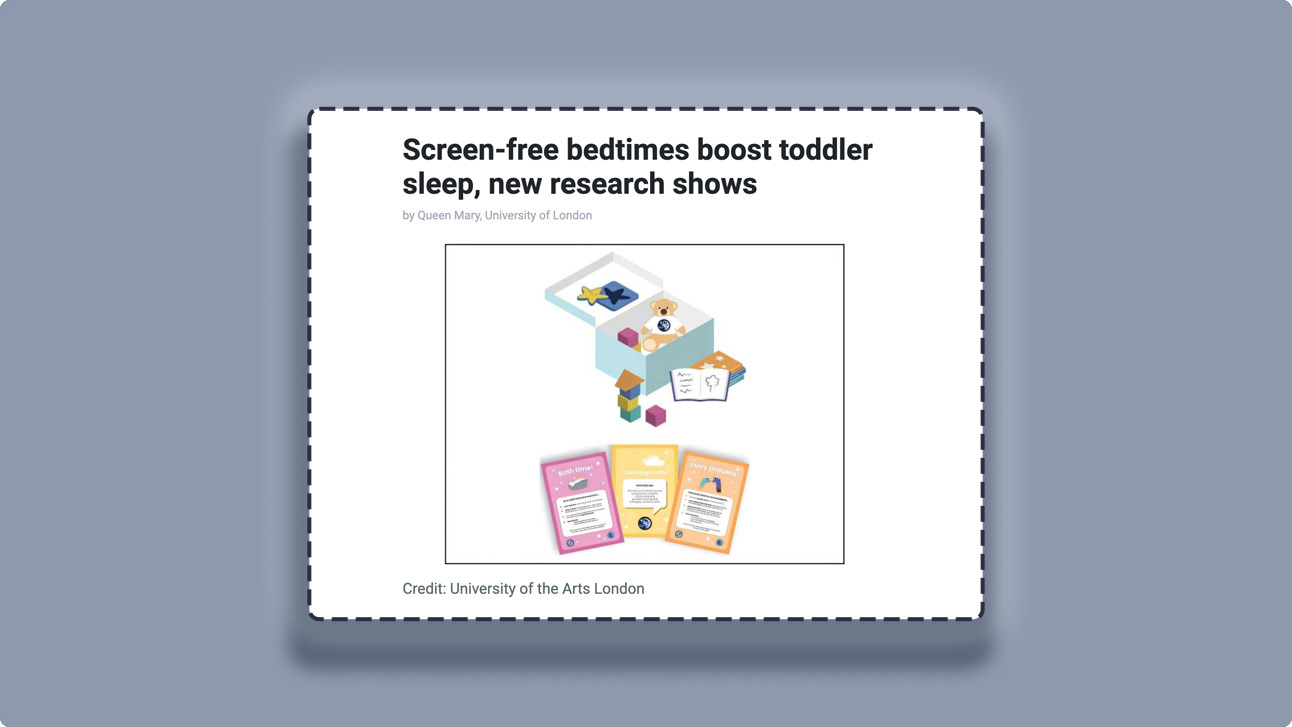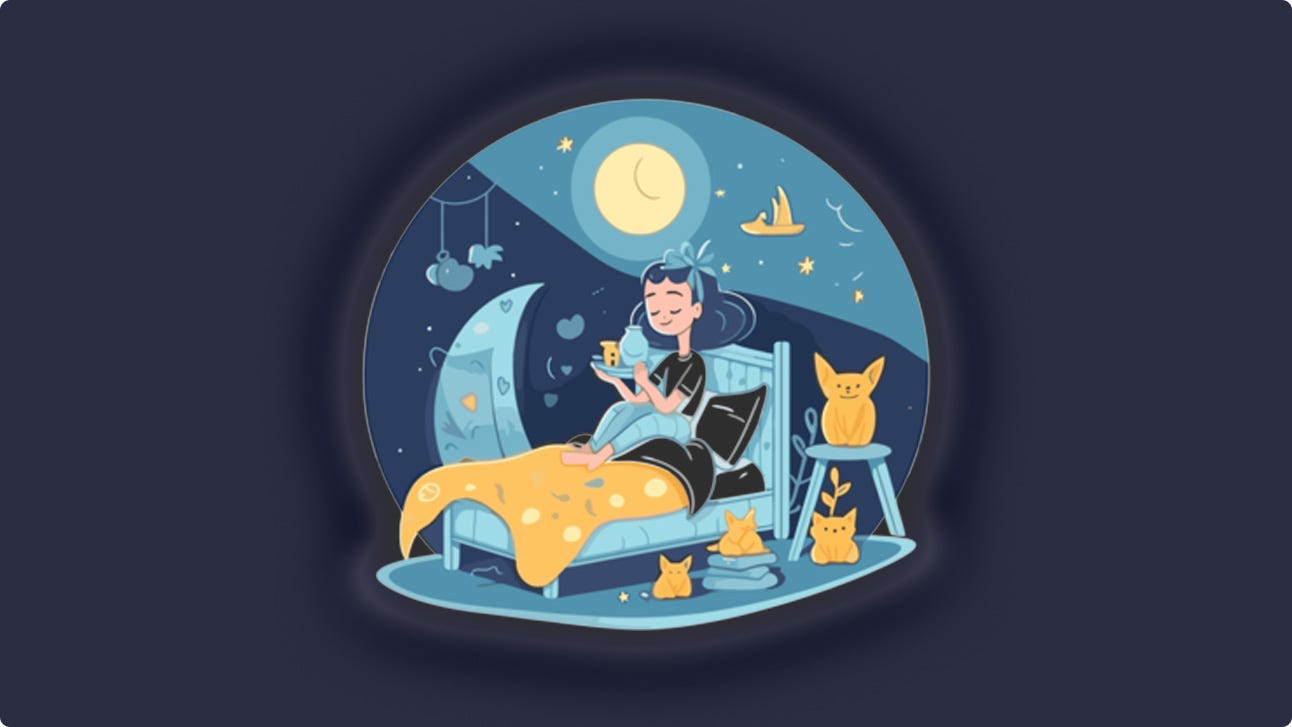How toddlers' screen time usage can inform our own bedtime routines
And a discussion around how bad science gets reported widely, even when the study says the opposite thing
Top of the morning, sapien. Welcome to Common Sense Medicine, where I try and keep you up to date on the latest and greatest in longevity science.
I’m getting back into the gym, albeit with some decrease in weight moved. I’m finding it hard to complete my workout in an hour, something that I’ve done pretty easily since I started, and I dislike that about powerlifting / strength-based protocols. I think the time associated with this workout to move the weight is getting too long for me.
As a result, I’ve tried to focus on the peripheral aspects of my training this week to troubleshoot how I can progress while I’m trying to finish up this program. I’ve found three things which I’m trying to improve upon:
Stretching - I felt a little hip impingement yesterday, so I want to focus on opening up that hip rotation through using exercises like these. I’m going to try and set aside 20 minutes in a day to focus on stretching & sleep before bedtime to wrestle myself away from the phone before bedtime.
Sleep - That brings me to my next objective - sleep. This is going to be the focus of today’s article, but sleep is such a big pillar of how I recover. Unfortunately, I’ve been waking up a bunch during my sleep so I’m really focused on making it a little more restful as I get to bed. Hopefully the stretching & no screen policy will help.
Meditation - mental health has been something that I’ve been focusing on, just so that I am not extending myself. I’m trying to make small, manageable changes, to really allow myself to focus on training and doing well in my career as well. I think 5-10 minutes of taking a beat, and relaxing has helped me in the past so will try to continue that until the end of the year.
Sleepy toddlers and screen time
Recently, have been more interested in how to optimize my own sleep. It’s a pretty hard thing to do — there is always something more to do, especially when you’re inefficient through the day and on top of that, you need time to “wind down” before bed. This article caught my interest because I’ve been trying to optimize my sleep time routine, and I was wondering whether it actually made any difference to the way that people sleep.
Unfortunately, it showed me how bad science unfortunately makes it into headlines. So the authors Pickard et al. wanted to know how toddler screen time was associated with poorer sleep.1 Most people know that scrolling and screen time before bed is bad for adults, but would we see a causal relationship between worse sleep and screen time in toddlers as well?
Parents randomized to three groups, focused on a screen-time intervention
The authors wanted to know whether removing screen time the hour before bed and replacing it with other activities, like reading or calming play, improved toddler sleep and attention. To do this, they separated the parents into three groups. The first group included a parent-administered screen time intervention (PASTI) called a bedtime box, with toys and instructions of what to do before bed, along with a call from an investigator to reflect on their strategies to reduce screen time. In the other two groups, the families either received the same bedtime box or no box at all, but were not coached on changing their habits at all. This way the investigators could show that screen time was the independent factor associated with worse or better sleep.
This was a 7-week trial, and parents were instructed to fill out baseline and post-experiment surveys and had laboratory assessments to evaluate attention after the experiment, mostly through eye tracking. Actigraphy (essentially wearing a smartwatch, but just for tracking activitity) was used to measure sleep. Families were blinded to the trial interventions, and they didn’t know what the purpose of the study was, they only knew that it was measuring sleep and pre-bedtime activities of toddlers.
What I found interesting about the demographics (controlled for age, sex, socio-economic status, and ethnicity) was that mothers overwhelmingly filled out the surveys throughout the experiment (on weekday and weekends), with only 2 fathers overall filling out these surveys out of 105 kids.
Results showed only a modest non-significant improvement in sleep
Okay, so here’s where it gets interesting—while this trial was a success based on the adherence for all of the subjects doing what they were supposed to throughout the trial (90%+ participation rate), it was a dud in terms of its outcomes. But you wouldn’t guess that based on the headlines which were reported. It’s irresponsible to say that “reducing screen time leads to better toddler sleep” when that wasn’t even reported in the article.
Let’s dive into the data—the first, and one of the only, metrics which was statistically significant was that total screen time an hour before bed dropped, by an average of 13 minutes between the “no intervention” (NI) group and PASTI group, and 9 minutes between the “bedtime box only” (BB) group and the PASTI group. Otherwise, while there were modest effects of reduced sleep time, fewer night awakenings, and higher sleep efficiency compared with the NI / BB group, the most important part was that none of them were statistically significant. Next, based on the eye tests which were done to evaluate attention span, they showed no statistically significant difference between the PASTI group and the BB / NI group. All that to tell me that if I give a baby a teddy bear and take away their screen, they will use the screen less. Great.
Okay, so I think I’ve covered that the reporting of the article was bad, but it gave me a more appreciative look on how science should be reported. I think the way that I want to keep doing this newsletter is really explaining the study, and focusing on the takeaways for myself, hoping that the reader is smart enough to decide whether to apply it to their own lives.
Bedtime routines are important, but not critical
Empirically, after trying this for a while, I think it is kind of intuitive that screens impact our sleep. For example in my situation, I stay up focused on the screen, we get annoyed that we spent so long scrolling on YouTube shorts, and then we reason that we should cut out the screens because of the “blue light” that’s blasting into my eyes. Not to say that eye strain isn’t a problem, but I think that there’s an undercurrent which is missed in these studies which might be that stimulating activities may cause a more detrimental impact to sleep than what is shown here. We use screens when our brain is “on” and we constantly try to do more and more activities, when we really need to slow down and do less.
I think that that one factor that the investigators didn’t consider about the BB and the NI groups is that they might also have used calming activities before bed, just not the same “calming” activities as in the bedtime boxes. Who is to say that playing with a teddy bear isn’t stimulating? Toddlers may have the same brain circuits light up as we do when they are playing with blocks when they are looking at a screen. While we still may get more of a “dopamine rush” by working on a screen, we can still get that stimulation from doing something else. I think what I learned from this study is that the value of a bedtime routine lies in the fact that you signal to your brain that you’re shutting it off, not keeping it on.
Screens are so potent in keeping your brain in a constant state of hyper-overload that you’re jumping from one thing to the next, not really thinking that you’re concentrated, until you realize that an hour has gone by and you’re still scrolling, leading to what Gen Z terms as “brain rot.” A logical night-time routine, in my opinion, could be starting with getting ready for the next day, maybe washing your face, brushing your teeth, and really just meditating and focusing on gratitude or even stretching for the majority of the time. Let’s see if we can try that for some time.
REMEMBER, IT’S JUST COMMON SENSE.
Thanks so much for reading! Let me know what you thought by replying to this email.
See you next week,
Shree (@shree_nadkarni)
The information provided here is not medical advice. This does not constitute a doctor patient relationship and this content is intended for entertainment, informational, and educational purposes only. Always consult with a doctor before starting new supplementation protocols.
Pickard H, Chu P, Essex C, et al. Toddler Screen Use Before Bed and Its Effect on Sleep and Attention: A Randomized Clinical Trial. JAMA Pediatrics. Published online October 21, 2024. doi:10.1001/jamapediatrics.2024.3997





